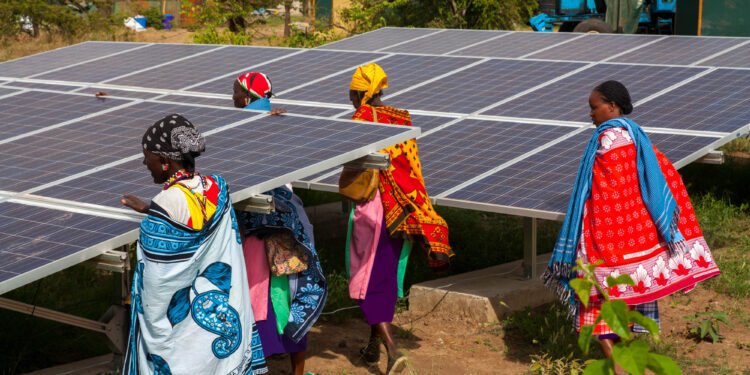
Particularly in the solar photovoltaic (PV) industry, which is generating new economic possibilities and enhancing livelihoods, women in Africa are increasingly participating in renewable energy.
This is according to a report by the International Renewable Energy Agency, (IRENA), titled “Renewable energy and jobs: Annual review 2024.”
The report notes that African women are demonstrating that they are important forces behind the movement for sustainable energy solutions, despite the many challenges they face.
According to the International Renewable Energy Agency (IRENA), women account for 38% of the workforce in Africa’s solar PV industry.
This figure exceeds women’s 32% participation of the worldwide renewable energy workforce, suggesting progress toward gender parity in Africa.
“Women continue to hold an unequal yet steadily growing share of jobs in renewable energy. The global association for the off-grid solar energy industry (GOGLA) reports that women hold 27% of all full-time equivalent (FTE) jobs in the off-grid solar sector,” the report states.
“IRENA’s solar PV gender survey reveals that women constitute 38% of the workforce across all roles in Africa’s solar PV industry,” it adds.
National data from particular African nations support this progress. Women’s engagement in decentralized solar PV systems is highest in Kenya (41%), Ethiopia (37%), Nigeria (35%), and Uganda (28%) (Power for All, 2022).
“This regional average is consistent with national data from select countries: decentralized solar PV employs 41% women in Kenya, 37% in Ethiopia, 35% in Nigeria and 28% in Uganda (Power for All, 2022).
IRENA’s survey estimates women’s participation across the entire solar PV sector (decentralized and utility scale) at 40% (IRENA, 2019),” the report reads.
“This compares with women’s 32% share of the overall renewable energy workforce – a relatively modest figure, although 10 percentage points higher than in the wider energy industry (IRENA, 2019),” it adds.
In conclusion, African women play an important role in the renewable energy sector, notably in solar PV and other clean energy technologies such as biogas and clean cooking solutions.
Despite various hurdles, their increased engagement is creating good change across the continent. With ongoing assistance, African women will continue to be a tremendous force in defining the future of energy, improving not just their own lives but also those of their communities.










